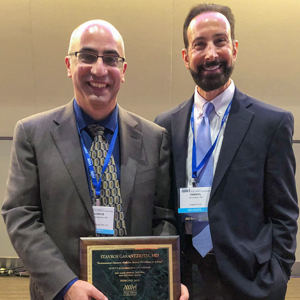We can now see how and where human antibodies interact with peanut allergens thanks to Geoffrey Mueller, Ph.D., director of the NIEHS Nuclear Magnetic Resonance Research Core Facility, and collaborators from Massachusetts General Hospital (MGH) and University of Paris Saclay.

A structural biology approach called X-ray crystallography revealed why oral immunotherapy, which treats food allergies through incremental increases in consumption of the allergen, can lead to sustained tolerance in some individuals but only transient tolerance in others.
The new research findings, which are published in the Journal of Clinical Investigation, may help investigators improve allergy treatments so that all patients can benefit.
Therapies are not one-size-fits-all
Food allergies are caused by IgE antibodies that are generated by the immune system and bind to allergens such as peanuts, triggering a reaction that in extreme cases can be potentially life-threatening.
Ingestion of allergens through oral immunotherapy as treatment for food allergies increases blood levels of allergen-specific IgG neutralizing antibodies that can block IgE-mediated allergic reactions. Only a subset of individuals with peanut allergy develop sustained responses to oral immunotherapy, however.
“We hypothesized that in people with long-lived tolerance after peanut oral immunotherapy, allergen-specific protective antibodies may have unique properties — for example, in how they recognize the allergen — that may result in their ability to more effectively neutralize the allergen on exposure and therefore result in tolerance,” said senior author Sarita U. Patil, M.D.
Why some but not others?
Blood collected from pediatric and adult participants of two peanut oral immunotherapy clinical trials at MGH were analyzed, and then the researchers applied a fluorescence-based method developed previously by Patil to identify cells in the blood that make antibodies against the peanut allergen.
The team discovered that neutralizing antibodies from patients with sustained tolerance after immunotherapy block certain regions of the peanut allergen, thereby disrupting the ability of IgE antibodies to bind. Antibodies from patients with only transient tolerance after immunotherapy did not block these same regions.
Seeing is believing
A team of researchers at NIEHS led by Geoffrey Mueller, Ph.D., was able to specifically identify these important regions.
“We were able to use X-ray crystallography to see some of the first complex structures describing how human antibodies interact with peanut allergens,” Mueller said. “After studying allergens for so many years, it was very gratifying and an important new development.”
This research is the first to describe neutralizing antibodies in allergy, describe their mechanism, and identify tools to assess their efficacy in preventing allergy IgE antibodies from binding to the allergen, according to Patil.
“This provides a new path for both therapeutic and diagnostic test development,” Patil said. “As a therapeutic, neutralizing antibodies may be able to provide clinical protection. From a diagnostic perspective, we may be able to predict future tolerance development based on the presence or absence of these antibodies in patients.”
Citation: LaHood NA, Min J, Keswani T, Richardson CM, Amoako K, Zhou J, Marini-Rapoport O, Bernard H, Hazebrouck S, Shreffler WG, Love JC, Pomes A, Pedersen LC, Mueller GA, Patil SU. 2023. Immunotherapy-induced neutralizing antibodies disrupt allergen binding and sustain allergen tolerance in peanut allergy. J Clin Invest. 133(2):e164501.
(This article is based on a press release by Noah Brown, Massachusetts General Hospital.)









